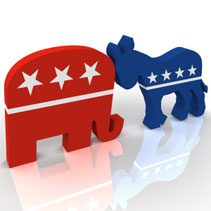By Andrew Canfield, US Daily Review Contributor
 Ample column space and countless television segments have been dedicated to the increasing polarization of American political life. While much hand wringing has been devoted to this development, few in the media have paused to consider the reasons why the rhetoric has become so increasingly heated and yet so staggeringly detached from reality.
Ample column space and countless television segments have been dedicated to the increasing polarization of American political life. While much hand wringing has been devoted to this development, few in the media have paused to consider the reasons why the rhetoric has become so increasingly heated and yet so staggeringly detached from reality.
The silly partisanship fostered by the ego-llectuals on the left and right has indeed become downright nauseating. Both sides of the aisle have their choice news sources, which often time amount to little more than ideological comfort food and sermons preached to the converted. The sheer number of opinion outlets available for consumption has made it easier to listen to news and commentary that only confirms our personal worldview, leading to bickering that sounds nonsensical to the majority of Americans not immersed in the Fox News/MSNBC orbit of thought. Many have simply grown weary of following politics, opting to throw up their hands in disgust when presented with the binary option of joining either the Bush or Obama team. An increasing number of voters have become content to check the “Neither” box and tune out both sides’ spin altogether.
This proliferation of news sources has granted independents access to talking points from both sides of the aisle. This is an excellent development for those who choose to capitalize on it. But it has also given the Democratic and Republican party faithful the ability to entirely tune out news that conflicts with their respective party’s company line. Feckless partisanship based on such blind loyalty is the sort of “divisiveneness” being decried by those seeking a coherent and nuanced debate; a thoughtful back and forth discourse would be welcomed by these same individuals.
Divisiveness brought about by genuine disagreements and philosophical objection is not a reason for complaints. In fact, it is a rarity and cause for admiration. Most Americans instinctively recognize such conviction when they see it, yet it is an infrequent occurrence in a sector of American life where nearly every word uttered rings with hollowness.
But the recent debt deal debate and the American left’s reaction to the fiscal hawks in Congress crystallized just how much unthinking, reflexive partisanship has poisoned the well of reasonable political discourse. The arguments over budget cuts deteriorated rapidly into emotionally charged, left/right feuding seemingly overnight.
Instead of admiring the Jeffersonian, strict constructionist philosophy of the broader limited government movement, the American left has instead launched a smear campaign on those who comprise its rank and file. Had they elected to do so, intellectually honest liberals could have forged common ground with some positions favored by small government Constitutionalists and conservatives. Actions such as dialing back the increasingly invasive police state and removing the federal government from the social issues debate could have offered hope for some fusion, but most liberals took the easy route and settled for partisan sniping.
Left-leaning news outlets could have acknowledged that a revival of Barry Goldwater-style, budget conscious conservatism was in our midst. Instead, Americans were treated to carelessly spewed epithets: “hostage takers” and “terrorists” being a few of the more amusing references to those in possession of their fiscal sanity faculties. Establishment Republicans were lumped in with genuine conservatives, an occurrence brought about by the failure of the U.S. media to thoroughly report the different philosophies shaping the budget debate.
The unwillingness of partisan Democrats to find any commonality with those perceived to be on the “Red” team was strikingly apparent during the entire budget debate. Partisan blinders are accessories both political parties take full advantage of, and Americans will continue to gravitate away from each of them as long as this persists.
—————————————————————————————————————————————
Andrew Canfield is a recent graduate of the University of Texas at Arlington and a resident of Bossier City, Louisiana. He is the community relations director at a property management company and enjoys writing for the local newspaper and fitness web sites in his spare time.
Andrew is a fan of outdoor activities, and loves running and cycling in his spare time. His favorite economic author is F.A. Hayek, and he considers himself a libertarian Republican.

Average Rating